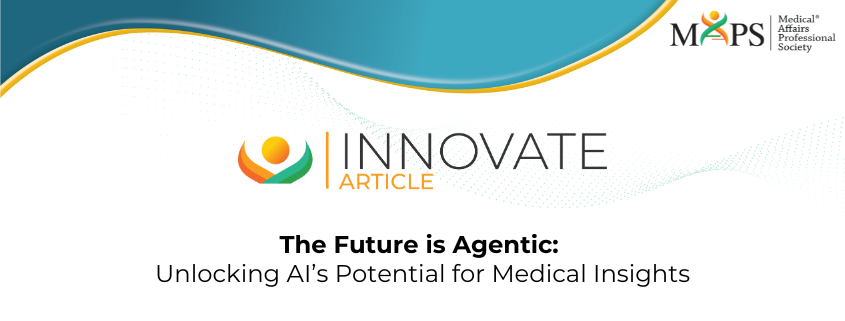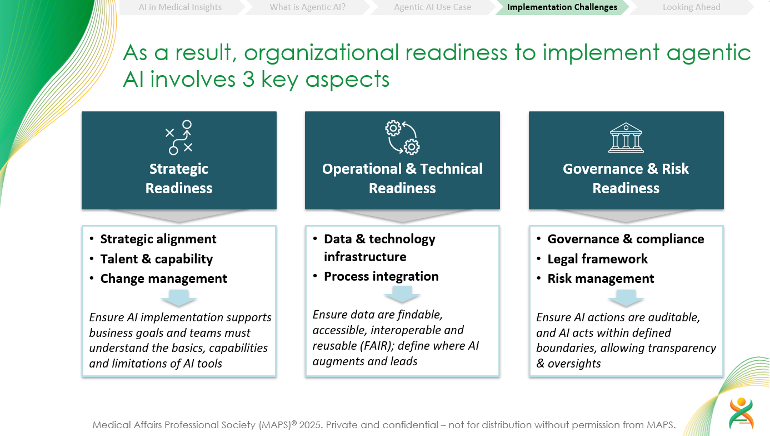The Future is Agentic: Unlocking AI’s Potential for Medical Insights
By the MAPS Insights Focus Area Working Group (FAWG)
Executive Summary:
This summary explores learnings and discussion from the MAPS Insights Forum held on June 25, 2025, titled “The Future is Agentic: Unlocking AI’s Potential for Medical Insights.” The session examined how agentic AI is redefining medical insight analysis by moving beyond generative models toward systems that operate autonomously, adapt in real time, and deliver validated, actionable recommendations. For Medical Affairs, this shift marks a strategic inflection point which can enable teams to close the insight-to-action-loop faster, with greater scale and precision. This article synthesizes key insights from the session and outlines how organizations can begin translating agentic AI’s potential into practice, while managing the operational, data, and compliance challenges that accompany its adoption.
Introduction:
According to panelists, Medical Affairs may be approaching a strategic inflection point as the volume, complexity, and velocity of medical insights continue to increase. While early applications of AI in this space have focused on summarizing and structuring information through generative models, the panel emphasized that agentic AI represents a fundamentally different paradigm. These systems are designed to autonomously ingest data, identify patterns, and generate context-aware, real-time recommendations with minimal human input. This shift, as discussed by the panel, could enable Medical Affairs teams to move from retrospective analysis to continuous, insight-driven decision making, potentially improving agility, scientific alignment, and execution speed.
Current Landscape and Agentic AI Implementation Considerations:
The MAPS panel underscored the uneven maturity curve across Medical Affairs organizations with respect to AI adoption. While some teams are early in exploration phases, others have begun operationalizing agentic AI, particularly in use cases related to launch readiness, insight consolidation, and strategy refinement. However, challenges persist around data quality, interoperability, and the effort required to align inputs with FAIR (findable, accessible, interoperable, reusable) principles, privacy laws (e.g., General Data Protection Regulation (GDPR), and internal data security protocols.
Drawing from the MAPS panel discussion, the following represent key expectations for Medical Affairs leaders navigating agentic AI implementation:
- Understand the strategic and operational shift agentic AI introduces compared to Generative AI.
- Identify core implementation enablers, including cross-functional alignment, compliance readiness, and data infrastructure.
- Anticipate barriers such as integration complexity, resource constraints, and trust in autonomous technology.
- Translate theoretical promise into high-value, scalable use cases across the insight-to-action workflow.
Strategic Implementation of Agentic AI:
Agentic AI is layered intelligence technology which autonomously sets goals, executes tasks, decision making, and planning while remaining adaptable to changing environments. This capability presents potential opportunities to satisfy key gaps in medical insight strategy through accelerating insight-to-action.
The most frequent gap in the medical insights feedback loop lies between data collection and the translation of those insights into strategic action. Agentic AI requires structural readiness surrounding integration, validation, and governance. For AI to be able to effectively provide insights and inform planning for the team, organizations must establish feedback tracking measures to ensure the data being collected are accurate and relevant. The technology is ready for use, but successful integration with Medical Affairs teams needs organizational ownership and cross-functional coordination.
Why Agentic AI Matters:
With the emergence of agentic AI, Medical Affairs can fundamentally shift from reactive analysis to proactive, strategy-driven intelligence. Unlike Generative AI (genAI), which responds to human prompts by summarizing data or generating content, agentic AI continuously monitors diverse data streams, identifies emerging patterns, and autonomously recommends next steps, all within the guardrails of compliant frameworks. Like genAI, agentic AI systems are tailored to ingest multimodal data, such as CRM records and MSL insights and interpret them in context but also enables accelerated actions through automated processes.
“We are not talking about removing human control, rather micromanagement. Think of it as a colleague who knows the bigger picture and can execute a task on their own without guidance. In medical insights AI can detect rising concerns about a safety signal. A genAI model can summarize insights whereas agentic AI system can autonomously scan model and compare patterns. This is something we lack as humans and believe we cannot do efficiently” – MAPS Insights Forum Panel
Member
As a result, Medical Affairs teams can now accelerate insight cycles, uncover unmet needs earlier, and drive scientific alignment at scale across geographies, transforming AI from a support tool into a strategic partner.
Opportunities & Impact:
Further, agentic AI’s value lies in its ability to unlock strategic capacity by freeing Medical Affairs teams from time consuming manual tasks. By automating insight generation and replacing static dashboards with dynamic, on-demand intelligence, agentic AI allows teams to shift their focus from managing data systems to engaging in higher-value strategic work and interpreting data to drive action. This reallocation of effort not only reduces operational burden but also accelerates timelines for critical initiatives such as launch planning and stakeholder engagement ultimately amplifying the impact of Medical Affairs across the organization.
“One cost saving and efficiency that is visible in the long-term is speed. Not the speed to retrieve information, but the speed to take action. When we are launching we don’t have the time to look through all the resources and responses so we are able to use AI to do this and deploy our attention to other activities” – MAPS Insights Forum Panel Member
By automating insight gathering, interpretation, and acting on medical insights populated through dashboards, agentic AI shifts team members roles from preparing systems and information to other more in depth workstreams. The shift from human controlled dashboards and information gathering minimizes manual workloads across the board and accelerates launch timelines.
Trust and Governance:
To ensure adoption of agentic AI is both safe and scalable, organizations must establish effective guardrails with thresholds to trigger further evaluation across processes. Agentic AI systems are increasingly equipped with context-aware filters, sentiment calibration, and embedded compliance guardrails to prevent misuse or misinterpretation.
Medical Affairs as the Strategic Integrator
Panelists emphasized that Medical Affairs is uniquely positioned to drive the meaningful application of agentic AI given Medical Affairs teams’ role in applying with purpose, aligning with business goals, and grounding in data that is both high quality and contextually relevant.
“Agentic AI cannot succeed in isolation; nothing can. Medical Affairs have to be the conductor when it comes to insights and strategies. In simple terms, agentic AI works best when it has clear goals, data, and feedback. Furthermore, it requires all teams and relevant functions to work as one to achieve this” – MAPS Insights Forum Panel Member
Key areas Medical Affairs must emphasize are:
- Defining Strategic Purpose: translate medical strategy into actionable AI objectives (e.g., signal detection for launch readiness).
- Ensuring Data Quality & Context: Curate and structure field insights, literature, and congress outputs with consistent tagging and relevance thresholds
- Building Trust & Scientific Integrity: Establish validation workflows and scientific review checkpoints for AI-generated
Recommendations for AI Integration in Medical Insights:
To successfully integrate AI into medical insights there must be a solid groundwork set which defines why it is being utilized, resulting in cross functional buy-in from different divisions across the organization. Accompanying solid explanatory groundwork, there is also a need for a strong data foundation that ensures the data is FAIR and prioritizes high quality multimodal inputs. It is important to establish auditability from day one by building systems that track AI outputs, decisions, and triggers. This ensures transparency and facilitates compliance reviews and iterative model improvement. Finally, it is critical to emphasize that agentic AI is not replacing judgment but enhancing strategic focus. This will empower teams to shift from data preparation to proactive insight orchestration.
Looking Ahead: In considering integration of agentic AI into Medical Affairs processes, there are key steps to keep in mind to ensure optimal involvement and use:
- Select Low-Risk & High-Value Pilots: Focus on use cases that demonstrate clear utility without significant compliance risk. Automating medical insight classification and enabling real-time HCP signal detection are strong starting points that showcase AI’s strategic value while maintaining oversight.
- Aligning Internal Stakeholders Early: Success depends on collaboration across Medical Affairs, compliance, IT, and data science. Early alignment ensures that agentic AI systems are built with the right inputs, adhere to necessary standards, and are applied in ways that are relevant, compliant, and impactful.
- Establish Thresholds and Auditability from Day One: Define when and where human oversight is needed, such as for sentiment analysis or triggering alerts. Building in auditability from the outset ensures transparency and trust while enabling continuous learning and model improvement.
- Prioritize Data Foundations: FAIR and Labeled: High-quality, structured data is non-negotiable. Applying FAIR principles and consistent labeling allows agentic AI systems to scale across functions and geographies, making insight analysis faster, more accurate, and more contextually meaningful.
- Enable Change Management and Mindset Shifts: Teams need training on how to use agentic AI and how to trust it. Empowering Medical Affairs professionals to work alongside AI systems as partners will be key to unlocking their full potential to drive adoption and maximize impact.
Conclusion:
Agentic AI represents a critical priority for Medical Affairs. If Medical Affairs is to lead in enterprise decision-making, it must proactively shape how AI is governed, applied, and scaled. This includes setting data standards, defining use cases, and ensuring ethical, compliant integration across functions. Medical Affairs teams can move from insight gatherers to insight orchestrators, using agentic AI to actively drive future strategy and action.




